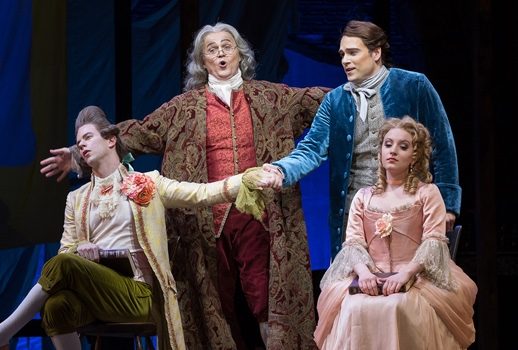
But that should be a good thing, right? I mean, how often does one get to hear Bernstein’s gorgeous, rollicking, and varied score nursed by a full orchestra and the artistic resources of an opera company? Though the answer may be “quite often” these days, the charming, uneven musical, an ill attempt at fashioning one satire into a different satire by way of romantic comedy, still asks questions and does so gently and with a grin.
Unfortunately, that grin is more of a grimace in this already well-traveled Zambello production (originally from Glimmerglass and seen at LA Opera). Setting the action in the frame of a theater (because why not?), Zambello’s emphasis the human suffering of the characters is inconsistent and illogical.
Bereft of a book that balances an excess of plot with a lack of character development, the musical bucks against a refocusing of the piece to narratives of oppression and suppression, especially with respect to the relationship between Candide and Cunegonde. If neither of them like each other because both are shoehorned into Society’s Norms™, then how can we believe that they’ll actually make their garden grow?
Indeed, if the musical hinges on two philosophies, they’re not optimism and pessimism; they’re hope and love, and aspects of the performance gave me feelings of both. In the title role, Alek Shrader’s Candide seems more laid back than eager, more easygoing than optimistic. To put it in NBC Thursday Night Sitcom words, he’s an Andy Dwyer when you need a Kenneth Parcell.
While watching, I realized that it’s been over ten years since Shrader appeared on the scene in Susan Froemke’s The Audition. There, he was billed as the next ‘King of the High C’s.” In the meantime, though his top notes are still accessed with relative ease, it’s his suave, fluid lower voice, where most of the good music of the part lies, that makes a mark.
He’s countered by a creamy-voiced Emily Pogorelc, who, in addition to her smooth soprano and expressive face, is not even graduated from undergrad Curtis. Condemned, as all Cunegondes are, to compete with Barbara Cook, Pogorelc brings a voluptuous pathos to her part. And though she’s game to downplay superficiality or irony in the character, as per the concept, it means that “Glitter and be Gay” seems more like Manon Lescaut doing “Rose’s Turn.”
Unfortunately, Denyce Graves’s Old Lady is more legato than legs, as the “dance” break in “I Am Easily Assimilated” proved. Though she maintains a unique warmth as a performer, she’s not a comedienne and what made her so effective in other repertoire, serenity, control, vocal flexibility, worked against her here.
Wynn Harmon works awfully hard and seems to be having the most fun as Pangloss/Voltaire, but the doubled part seldom works well. Frederick Ballentin eagain proves himself an asset to the Domingo-Cafritz Young Artist Program as a persuasive and high-energy Cacambo while Edward Nelson’s Maximilian is unflagging in its shtick.
While Zambello’s direction of the piece often seemed contrary to what the piece is trying to say, that a balance of optimism and pessimism, with a firm belief in love,will buoy us through the darkest storms, Nicole Paiementkept everything firmly earthbound in the pit. Starting with a plodding reading of the exuberant overture, the orchestra never sounded better than “fine” and yielded no answers in the evening-long search for ebullience and El Dorado.
Candide seems to be making a comeback in a big way, especially with opera companies that want a Bernstein show that does more with voice and less with dance than West Side Story. But as controversial as it may be, I couldn’t help but think that the Kennedy Center owes it to Bernstein to champion his 1971 Mass that opened the Center more so than any other piece of his. But until that happens, Zambello seems to be the only Celebrant at Washington National Opera.
Photo: Scott Suchman



